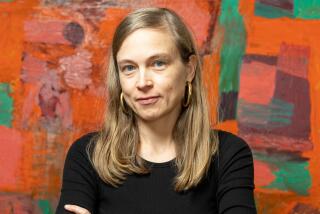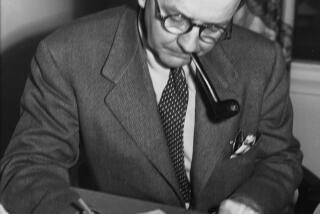Deborah Digges dies at 59; distinguished poet and memoirist
Deborah Digges, a distinguished poet and memoirist who wrote lyrically and hauntingly about the challenges of everyday life, fell to her death April 10. She was 59.
Digges was found on the ground outside McGuirk Alumni Stadium at the University of Massachusetts in Amherst and taken to a Northampton, Mass., hospital, where she was pronounced dead, said Edward F. Blaguszewski, a university spokesman.
Police are calling her death an apparent suicide. No foul play was suspected.
Her oldest son, Charles, said he “strongly questions” whether his mother’s death was a suicide. She often exercised at the stadium, no one saw exactly what happened and she left no note, he said.
“Given that much of her work is a celebration of life and nature, I feel the circumstances of her death are inconclusive,” he said.
Digges, who lived in Amherst, joined the English faculty at Tufts University in Medford, Mass., in 1986 after publishing her first collection of poems, “Vesper Sparrows.” It won New York University’s Delmore Schwartz Memorial Prize for best first book of poetry.
In a statement, senior administrators at Tufts called her death “a great loss for American poetry” and “an especially painful loss for the Tufts community where we knew her not only as one of the outstanding creative visionaries in American poetry, but also as an inspiring teacher, a generous mentor, and a cherished friend.”
For her third collection, “Rough Music” (1995), she received the Kingsley Tufts Award, given by Claremont Graduate School to an emerging poet. It came with $50,000.
Alice Quinn, who was the longtime poetry editor of the New Yorker magazine and a member of the Claremont panel of judges that honored Digges, called her poems “among the most beautiful and moving of any being written by a poet of her generation,” The Times reported in 1996.
Digges once said she liked “high-volume poems. I love confrontation. I love how light, color, time, memory, the present . . . collide.”
On March 9, she was in Pasadena with other Kingsley Tufts honorees for a reading at the Boston Court Performing Arts Center. She read “The Birthing,” a poem about how she and her husband stopped on the side of the road to deliver a calf. She wrote in part:
I watched him thrust his arms
entire
into the yet to be, where I
imagined holy sparrows
scattering
in the hall of souls for his big
mortal hands just to make
way.
Kate Gale, the editor of Red Hen Press who arranged the Pasadena reading, said the poem, like much of Digges’ work, was affecting because “she took an ordinary story and the way she tells it, it’s like the first calf that was ever born.”
“She writes in the lovely sentences of one who has touched blood, earth, water,” Gale said.
The keenly observant Digges often intertwined the human experience with images of nature, crafting works that had a “lived-in” feeling.
In her well-reviewed memoir “Fugitive Spring” (1989), she wrote about growing up on an apple orchard with nine siblings in Missouri and discovering poetry as a lonely military wife.
A second memoir, “The Stardust Lounge” (2000), was a wrenching account of her son Stephen’s difficult teenage years.
Her unorthodox and ultimately successful approach to pulling him away from gangs and drugs included a large menagerie of pets “meant to stir up his empathy,” she once said.
Deborah Leah Sugarbaker was born Feb. 6, 1950, and raised in Jefferson, Mo., a middle child of staunch Southern Baptists.
Her father, Everett Sugarbaker, was a doctor who ran a cancer clinic. Her mother, Geneva, was a nurse. Several siblings became physicians, but Digges invariably fainted any time she helped with minor medical procedures.
At 19, she married Charles Digges, an Air Force pilot who was often away on missions during the Vietnam War. They lived in Texas and California.
After having her first son, at 20, she began to write poetry.
After initially studying painting in college, Digges earned a bachelor’s degree in English in 1975 from UC Riverside and a master’s in English in 1982 from the University of Missouri.
She continued writing through a second pregnancy, her first divorce and a stint as a single mother and graduate student at the University of Iowa, where she attended the Writers’ Workshop and received a master of fine arts degree in poetry in 1984. A second marriage, to poet Stanley Plumly, ended in divorce in 1993.
A newspaper review of “Fugitive Spring” moved Franklin M. Loew, then dean of Tufts’ veterinary school, to contact her, and they married in 2000. They bonded over her animals’ needs, she once joked.
Digges volunteered at animal shelters and traveled frequently to East Africa, where she worked with children at an orphanage near Mt. Kenya.
Her fourth book of poems, “Trapeze” (2004), ached with the pain of loss. She wrote with “pitch-perfect” tone -- “the music of the elegy wild but subdued,” reviewer Carol Muske-Dukes wrote in 2004 in The Times. Digges particularly mourned her husband, who died of cancer in 2003:
Don’t call them back, don’t call
them in for supper.mourned her husband,
See, they leave scuff marks like
jet trails on the sky.
Digges is survived by her sons, Charles, a journalist, and Stephen, a photojournalist; a foster son, Trevor; two grandsons; her mother; five sisters; and two brothers.
Tufts University plans to hold a memorial in the fall.
The Poetry Society of America was also planning a memorial.
The family suggests any donations be made to the American Society for the Prevention of Cruelty to Animals, www.aspca.org.
More to Read
Start your day right
Sign up for Essential California for the L.A. Times biggest news, features and recommendations in your inbox six days a week.
You may occasionally receive promotional content from the Los Angeles Times.







